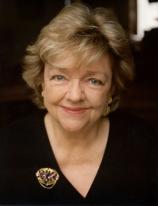Nights of Rain and Stars
Review
Nights of Rain and Stars
Having a new Maeve Binchy novel in store is like having a bathtub
filled and waiting --- a fleeting pleasure, but genuinely
comforting. So I'm sorry to say that NIGHTS OF RAIN AND STARS, the
latest by this beloved Irish writer, is a bit on the lukewarm side.
Even the title is odd: poetic, but generic.
The device is one cherished by Hollywood screenwriters as well as
by novelists: Take a group of strangers; isolate them (on a plane,
ship, hostile planet --- in this case, the Greek village of Aghia
Anna); set them in motion and see how they run. The prime suspects
here include five foreign visitors, one native, and one expatriate.
There is David, the Englishman who resists going into his father's
brokerage business; Elsa, the successful German TV reporter who has
left her job and her lover, and isn't at all sure she wants to go
back; Thomas, the divorced academic who wants to do the best thing
for his young son but doesn't know how; Fiona, the Irish nurse ---
and her dissolute, disagreeable boyfriend Shane --- who has defied
family and friends to follow her heart. And the locals: Andreas, a
taverna (restaurant) owner with an estranged son who lives in
America; and Vonni, originally Irish, the local saint with a
mysterious (and unholy) past.
In this sort of production, the group is always intended to
reflect, in microcosm, the wider society. And indeed, in NIGHTS OF
RAIN AND STARS, a number of modern issues are represented: domestic
violence, out-of-wedlock children, divorced parents,
alcoholism.… What these characters have in common, however,
is a ritual as ancient as the Prodigal Son: They are, in effect,
running away from home --- even Andreas, in his stubborn refusal to
contact his son; and even Vonni, though she left Ireland some 40
years ago --- but they aren't certain where they want to end
up.
On Aghia Anna, of course, they find out. One day, when they all
happen to have gone for lunch at Andreas's taverna, a tragedy on a
local tourist boat --- an explosion, many deaths --- unfolds in the
harbor below. They get to talking; their individual dilemmas are
identified; they find mutual comfort; QED. Another "of course": The
difficulties they're encountering in their lives back home are
reflected in what they do in this island laboratory: David, for
example, who can't get along with his own father, finds a
substitute in Andreas, and vice versa. Ultimately, these
disconnected people get a sense of belonging they've never felt
before --- from each other, and from the tiny Greek
community.
This is touching stuff, but pretty simplistic. Although Binchy, as
usual, gives us a lot of good, decent people to love (and she makes
them believable, which is not as easy as it appears), and one real
bastard to hate (it's Fiona's boyfriend, and is he ever rotten),
the story never acquires momentum. Apart from the question mark of
Vonni's past (revealed a little more than halfway through), there
isn't much tension. The story unrolls easily, like a gifted
talker's conversation, but it's merely pleasant rather than the
three-hanky read it should be.
And that, I think, can be put down to lack of context. In
abandoning her home turf, Binchy made a huge mistake. Sure, there
are characters from "Dub" in this book, but it's just not the same
(besides everyone in the main group sounds Irish, including
the Germans, Brits and Americans). In her other novels, Ireland
itself becomes a character: the lilt of the language, the tough
beauty of the women, the texture of each road and shop and
community. The flavor is unmistakable, and authentic. This setting,
in contrast, is as flat as a picture postcard. There is only the
barest sense of Greek life from the inside, and those details have
a travelogue feeling, as if they were introduced specifically for
local color.
I don't blame Binchy for wanting to branch out, for being typed as
"an Irish writer" is probably like being "a Southern writer" in the
U.S. --- if you are praised for your roots, you are also limited by
them; you are, in effect, ghettoized. If novelists are gifted
enough, they make their intimate and familiar locales into
something universal --- think Carson McCullers and Harper Lee; and
on the Irish side, Edna O'Brien, William Trevor, and Nuala
O'Faolain. But it's perfectly legitimate to be more ambivalent:
Colm Toibin both embraces his Irishness (in earlier books like THE
BLACKWATER LIGHTSHIP) and wants to transcend it (his latest, THE
MASTER, is about Henry James).
There are no rules for how a novelist uses (or doesn't use) her
cultural/regional inheritance. But I think that where Binchy is
from is a very deep part of how she works, and I hope that in her
next outing she returns to the places she knows --- and evokes ---
best. In other words, to quote The Beatles: Get back to where you
once belonged!
Reviewed by Kathy Weissman on January 13, 2011
Nights of Rain and Stars
- Publication Date: September 16, 2004
- Genres: Fiction
- Hardcover: 304 pages
- Publisher: Dutton Adult
- ISBN-10: 052594754X
- ISBN-13: 9780525947547











